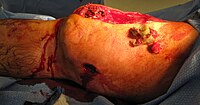
Photo from wikipedia
IntroductionThe treatment of abdominal solid organ injuries has shifted towards non-operative management (NOM). However, the feasibility of NOM for penetrating splenic trauma is unclear and outcome is believed to be… Click to show full abstract
IntroductionThe treatment of abdominal solid organ injuries has shifted towards non-operative management (NOM). However, the feasibility of NOM for penetrating splenic trauma is unclear and outcome is believed to be worse than NOM for penetrating liver and kidney injuries. Hence, the aim of the current systematic review was to evaluate the feasibility of selective NOM in penetrating splenic injury.MethodsA review of literature was performed using Pubmed, Embase and Cochrane databases. Studies on adult patients treated by NOM for splenic injuries were included and outcome was documented and compared.ResultsFive articles from exclusively level-1 and level-2-traumacenters were selected and a total of 608 cases of penetrating splenic injury were included. Nonoperative management was applied in 123 patients (20.4%, range 17–33%). An overall failure rate of NOM of 18% was calculated. Mortality was not seen in patients selected for nonoperative management. Contra-indicatons for NOM included hemodynamic instability, absence of abdominal CT-scanning to rule out concurrent injuries and peritonitis.ConclusionsThis review demonstrates that non-operative management for penetrating splenic trauma in highly selected patients has been utilized in several well-equipped and experienced trauma centers. NOM of penetrating splenic injury in selected patients is not associated with increased morbidity nor mortality. Data on the less well-equipped and experienced trauma centers are not available. More prospective studies are required to further define exact selection criteria for non-operative management in splenic trauma.
Journal Title: European Journal of Trauma and Emergency Surgery
Year Published: 2019
Link to full text (if available)
Share on Social Media: Sign Up to like & get
recommendations!